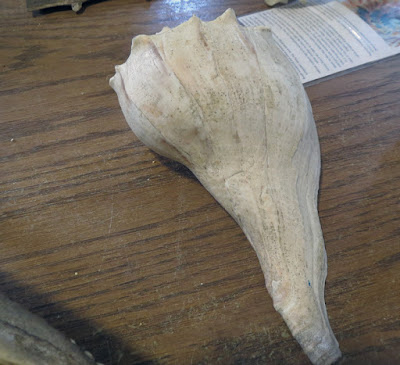Even though this is
quite a small aquarium, there are lots of interesting and unusual fish to see!
Aquarium at Rockport Harbor
These are Sharksuckers
(Echeneis naucrates):
They have a sucker on
top of their heads to attach to anything that moves! They are found
attached to sharks, manta rays, turtles etc.
If you find yourself with one attached to you, push forward to remove!
Sharksucker
He’s not dead! This is a Tripletail (Lobotes surinamensis):
It often floats on its
side at the water's surface, the coloration and movements resembling that of a
dead leaf. They are frequently mistaken for floating debris. They normally weight from 5 to 15 pounds but
have been found up to 50 pounds.
Tripletail
The Texas state shell
is the Lightning whelk (Busycon
perversum pulleyi):
Lightening Whelk. State shell of Texas.
Lightning whelks
are unusual in that they have a counterclockwise shell spiral (lightning whelks
are usually called "left handed").
This 'left-handed'
characteristic is reflected in the lightning whelk's scientific name perversum,
from the Latin word perversus, means turned the wrong way. Busycon,
from the Greek word bousycon, (meaning large fig) describes the general shape
of the shell. The subspecies name, pulleyi, honors Dr. T. E.
Pulley, a well known Texas naturalist and teacher. Its common name is derived from patterns of
"lightning-like" colored stripes that radiate along the sides of its
shell.
Females enclose each
fertilized egg into horny disc-shaped capsules while constructing a tough
cord-like membranous egg-case string, which connects 50 to 175 total egg
capsules.
Egg capsules
Each flattened egg
capsule can be as large as a quarter and contain as many as 200 eggs. The eggs
hatch and the young mature through all larval stages within the capsules.
Miniature whelks, with their shells, emerge through designated capsule ports
during late spring.
Baby Lightning Whelks
I don’t think I’ve ever
wondered how shells reproduce! It was
really fascinating to see these tiny little shells.
Next time - more
tourist fun!
Teri










"perversum, from the Latin word perversus"...... I love words... I'm downright perverse...
ReplyDeleteI learned about these whelks while volunteering at Eastern Shore of Virginia NWR. We found the egg casings and opened them up to find the babies. I have a collection of them.
ReplyDelete